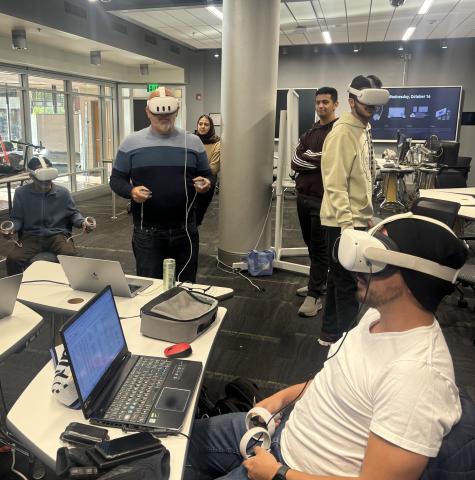Georgia Tech's Supply Chain and Logistics Institute partnered with the Language Institute to Launch a Virtual Supply Chain Final Exam
At Georgia Tech's Supply Chain and Logistics Institute, we’re committed to providing cutting-edge learning experiences, and our recent collaboration with the Georgia Tech Language Institute (GTLI) showcases this commitment.
As part of their preparation for undergraduate education in the U.S., GTLI students enrolled in the Supply Chain Fundamentals course, a foundational element of our program, recently took their final exam in a truly innovative way.
The students, hailing from GTLI, are part of a program designed to equip international students with the skills they need to succeed in American universities. Language Institute director, Katherine Samford, emphasizes, “Comprehensive preparation for undergraduate studies for our students means developing their English language skills, helping them build strong academic habits, and providing foundational exposure to content.
Working with Georgia Tech’s Supply Chain and Logistics Institute is the perfect match for our program mission.” Since many of these students have expressed a keen interest in pursuing a degree in Supply Chain Management, the Supply Chain Fundamentals course is a critical steppingstone toward their academic and professional goals.
What made this exam particularly unique was its delivery through our new Global Virtual Learning Environment (HITeC). HITeC, which we are also utilizing to modernize the content and pedagogy for our Master's in Supply Chain Engineering program, provided the perfect platform for these students to demonstrate their knowledge.
The system was developed in collaboration with Dr. Frederick Benaben and our partners at IMT, offering a group-based, collaborative simulation that mirrored real-world supply chain scenarios.
The exam required students to work together to make strategic supply chain decisions using a virtual simulation that focused on the global supply chain for e-skateboards. This allowed the students to interact with suppliers and customers from around the world in a controlled, immersive environment. Students had the opportunity to learn about the complexities of managing a supply chain, the impact of their decisions, and how to improve decision quality in real-time.
Their journey began with the analog Beer Game, a classic exercise in supply chain dynamics. From there, they transitioned into the virtual world, taking on various roles such as ordering, assembly, and shipping, each critical to the successful management of a supply chain. Throughout the course, they played multiple rounds, gaining hands-on experience that culminated in this final immersive simulation.
This initiative marks the first time our students have taken a final exam using HITeC, and the results were impressive. The students successfully navigated the challenges of the virtual environment, supported by a dedicated development team, including virtual teaching assistants live from France.
Ghala Alhajri, Georgia Tech Language Institute student and SABIC Foundation Year Program participant reflects, "We got practical, hands-on experience that will help us in our future job roles at our company, SABIC (Saudi Arabian Basic Industries Corporation). The VR experience showed me how technology can impact our lives in a positive way, and I understood the importance of communication in the field of supply chain management."
Our collaboration with IMT and the work in the Physical Internet (PI) lab at Georgia Tech demonstrates the global reach and cutting-edge nature of the supply chain education we offer. The success of this pilot program highlights the value of blending technology with education to create meaningful, real-world learning experiences.
We are excited to continue modernizing our courses and leveraging platforms like HITeC to ensure that our students are not only prepared for the challenges of today’s supply chain but are also equipped to lead in the supply chain of the future.
Stay tuned for more updates on our educational innovations and how we continue to shape the next generation of supply chain leaders.
